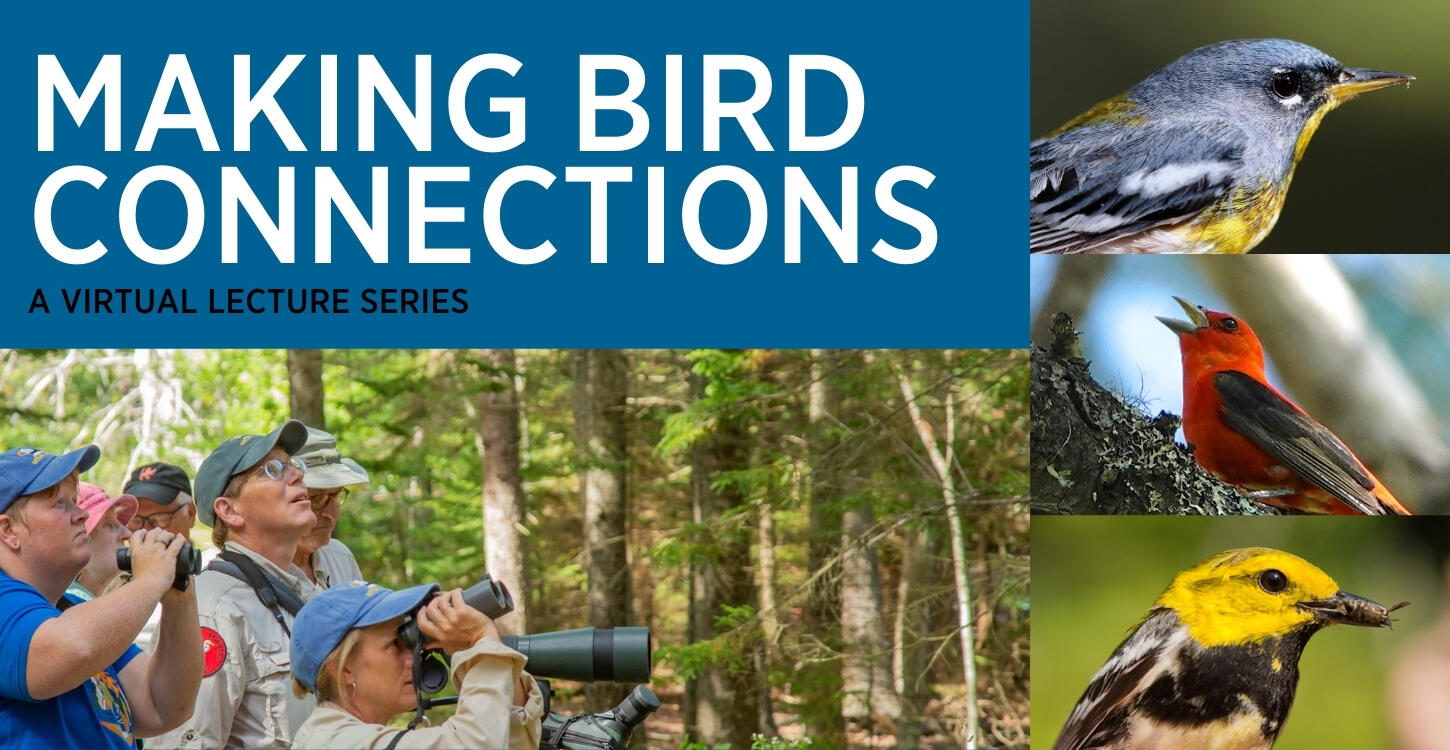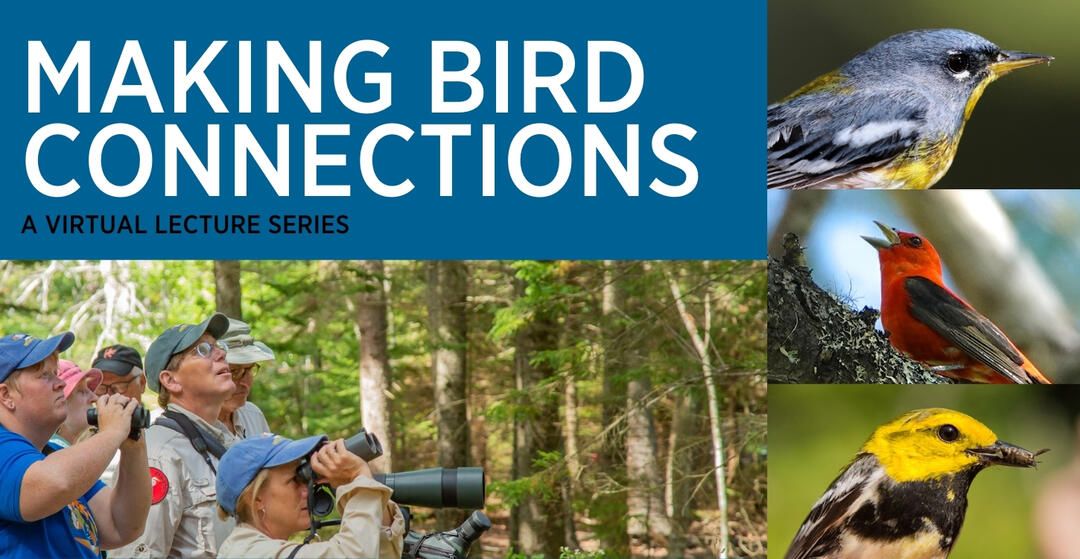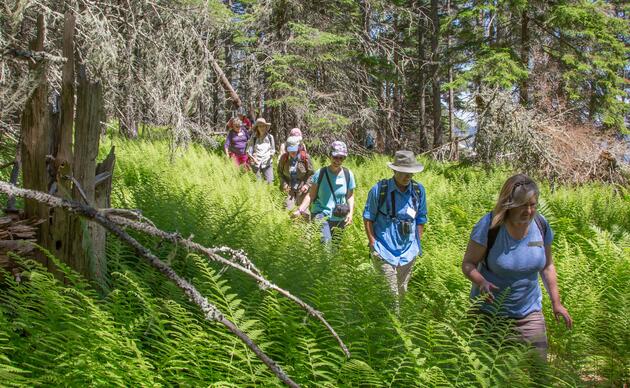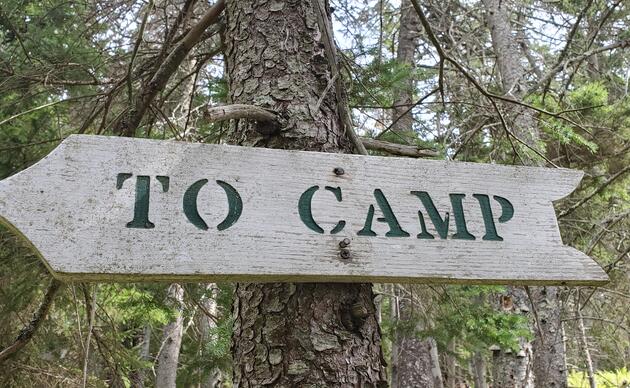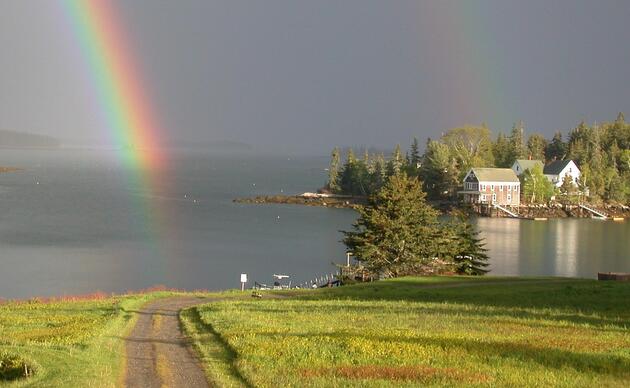Making Bird Connections: A Virtual Lecture Series
Hog Island Audubon Camp introduces our Making Bird Connections lecture series. Each week we feature a different bird-focused presenter followed by a connection to National Audubon Society's broader work. Learn from top experts in the field and join us for these FREE presentations. Donations are encouraged and can be made online: Donate Today!
Next Making Bird Connections Lecture Series is coming spring 2023!
Check back for updated dates and speakers.
Past Lectures
November 16, 2021: A World on the Wing with Scott Weidensaul and Audubon's Vice President of Boreal Conservation Jeff Wells. This program will not be recorded for future viewing.
December 14, 2021: Cooking for the Birds: How to Start Eating Locally and Sustainably with Chef Cleo Bell and Audubon's Conservation Ranching team Chris Wilson and Farley Green. Watch the recording on FB Live.
Link to the Squash, Carmelized Balsamic Onion & Goat Cheese Pizza recipe
February 15, 2022: Life on a Seabird Island with the 2021 Seabird Institute's Researchers Kay Garlick-Ott, Emily Sandly & Jasmine Eason and Audubon's Marine Conservation Policy Manager, Remy Moncrieffe. Watch the recording.
March 15, 2022 - Using Art for Bird Conservation with Catherine Hamilton and Audubon Magazine's Jennifer Bogo discussing the Audubon Mural Project. Watch the recording.
Donate to the Hog Island & Seabird Institute Mural Project.
September 29, 2020: Living on the Wind: Fall Migration with Scott Weidensaul and Audubon's Migratory Bird Initiative Director Jill Deppe - Stream the recording online.
October 6, 2020: Intro to Birding with Holly Merker and Audubon's Governmental Affairs Coordinator Tykee James - Stream the recording online.
October 13, 2020: Birding by Ear with Tom Johnson and Audubon's Climate Science Director Brooke Bateman - Stream the recording online.
October 20, 2020: Bird-friendly Communities with Jillian Bell and Audubon's Plants for Birds Marlene Pantin - Stream on Youtube.
October 27, 2020: Volunteering through the Lens with Jean Hall and Audubon Magazine's Sabine Meyer - Stream the recording online.
November 3, 2020: Vote for the birds! No presentation tonight.
November 10, 2020: Indigenous Conservation: Boreal Birds in Canada with special guests from Ray Rabliauskas, an elder from the Poplar River First Nation and Audubon's Boreal Conservation VP Jeff Wells - Stream on Facebook
November 17, 2020: Tracking Seabirds with Don Lyons and Audubon's Policy Analyst Charlotte Runzel - Stream the recording online.
Cost: FREE
Donations encouraged!
All donations go to support Hog Island Audubon Camp operations.
Meet the past presenters!
November 16, 2021
Scott Weidensaul
Author and naturalist Scott Weidensaul has written more than two dozen books on natural history, including Living on the Wind (a Pulitzer Prize finalist), The Ghost with Trembling Wings, and Of a Feather, as well as the Peterson Reference Guide to Owls of North America and the Caribbean. He is a contributing editor for Audubon magazine, a columnist for Bird Watcher's Digest, and has written for dozens of other publications. Scott has directed a major study of northern saw-whet owl migration for more than 20 years; is a co-founder of Project SNOWstorm (which studies snowy owls); a director of Project Owlnet, a collaboration of more than 125 owl-banding stations; and the Critical Connections project, which studies the migration of birds from Alaska's national park lands. He is also one of fewer than 200 licensed hummingbird banders in North America.
Scott is the director of Field Ornithology, Coastal Maine Bird Studies for Teens, Living on the Wind: Fall Migration, and Raptor Migration & Monhegan camps at Hog Island Audubon Camp. He is also an instructor for our Raptor Rapture Online Course and is currently the president of the Friends of Hog Island (FOHI).
Jeff Wells
As Vice President of Boreal Conservation at National Audubon Society, Jeff Wells conducts applied science, utilizes strategic communications that leverage public support, and builds and maintains partnerships that advance International Boreal Conservation Campaign (IBCC) conservation goals. Subject areas within this program include: biodiversity, conservation science, carbon storage, and links between Western Science and Indigenous Science/Traditional Knowledge. Jeff comes to Audubon from the Boreal Songbird Initiative (BSI), a member of the IBCC.
Jeff recieved his Ph.D. and Master's degrees in ecology from Cornell University. Jeff formerly worked for National Audubon Society at the New York State and later as the National Bird Conservation Director. During his tenure with Audubon, Jeff was located at Cornell University, where he continues as a Visiting Fellow of the Cornell Lab of Ornithology. He has authored or co-authored many scientific papers, reports, books, and popular articles on ecology and conservation topics including the book, Birder’s Conservation Handbook: 100 North American Birds at Risk. Jeff has been an instructor at Hog Island Audubon Camp and also has helped facilitate equity, diversity and inclusion scholarships for people to attend camp.
December 14, 2021
Chef Cleo Bell
Cleo was born and raised in Washington, DC. She attended McGill University in Montreal and has a BA in Cultural Anthropology. After graduating, she moved back to DC and began working at local restaurants, such as Again, a British Isles-inspired gastro-pub and Komi, a high-end Mediterranean restaurant. She has spent four summers as the Head Chef for the Hog Island National Audubon Society summer camp in Maine from 2015-2017 and again in 2021, working with local farms to bring fresh food to the Island and to happy campers. Recently Cleo has had the opportunity to cook and teach at Boston Public Market, with the whole Market to source from and the whole of Boston to serve.
At first glance, it might seem a strange road from cultural anthropology to cooking, but food and cooking are integral to the expression and transference of culture. As they say: culture begins at the table. By concentrating on serving local, sustainable foods, Cleo hopes to elevate the experience of the diner and to make a positive impact on the local food community.
Chris Wilson and Farley Green
Audubon's Conservation Ranching Program
February 15, 2022
Kay Garlick-Ott, Emily Sandley and Jasmine Eason - Eastern Egg Rock Seabird Reserach Team 2021
Kay Garlick-Ott is a first-year PhD student in the Hull Lab at the University of California, Davis Graduate Group in Ecology. Her goal is to produce high-impact social behavioral research that can be easily used by conservation management to improve species outcomes. Before coming to Davis, she worked as a summer field technician at Project Puffin for four consecutive summers. She started out as a research assistant on Eastern Egg Rock, returned as a research assistant on Matinicus Rock and then as island supervisor on EER from 2020-2021. These experiences directly inspired her graduate research questions and shaped the kind of scientist she aspires to be. People who have worked with her on the project can probably attest to my undying love for grubbing puffin chicks... and eating massive quantities of pasta, not at the same time.
Emily Sandly, Wildlife Biology B.S., Keystone College class of 2020, has worked two summers as a research assistant on Pond Island National Wildlife Refuge and Eastern Egg Rock island. Currently, she works as a Visitor Services Assistant at Hawk Mountain Sanctuary, the world’s first sanctuary for birds of prey and hawk migration count site. She is also a current Board Member of the Pennsylvania Chapter of the Wildlife Society and serves on two committees and assists other board members in planning and oversight for conferences and activities. In her spare time, she enjoys hunting with her family, camping, hiking, birding, and playing ukulele and violin. She hopes to pursue a master’s degree in the future and has interests in non-profit organization work, as well as state and federal agencies.
Jasmine Eason is a third year Animal Science student, and her concentration is in pre-veterinary medicine. Last summer was her first time working with the project and she was placed on Eastern Egg Rock Island.
Remy Moncrieffe
Remy is the new Policy Manager of Marine Conservation for National Audubon Society.
March 15, 2022
Catherine Hamilton
Catherine Hamilton grew up exploring the mountains and deserts of Southern California, and was pretty much born with a pencil in hand. She began birding at an early age with her father, developing a keen interest in both natural history and art, and started her first ornithological notebook at seven. Somewhat mysteriously her parents encouraged her to continue this behavior, and is still doing about the same things today.
Catherine holds a Bachelor of Fine Arts in Illustration from the Rhode Island School of Design and a Master of Fine Arts in Painting from Bennington College. She taught painting and drawing at RISD from 1997-2003, and has taught at other institutions and programs (Bennington College, Mass College of Art, Mass Audubon) throughout the 25 years she has been a professional artist. For the last five years she has been traveling and birding full time, keeping her studio on the road while maintaining her exhibiting and project schedules. Working out of wildlife refuges, urban environments, research stations, and museum collections, Catherine has been following birds around the world, making drawings and paintings. Her fine art can be found in private, corporate, and small museum collections in the US and abroad. Her bird illustrations can be found in publications like the recent Princeton University Press book “The Warbler Guide,” and in journals and magazines such as “Nature,” “Bird Observer,” and “Orion Magazine.” Catherine was also featured in the 2012 HBO documentary Birders: the Central Park Effect.”
Catherine loves sharing her passion for both the avian world and the world of drawing with birders and artists of all levels, and believes that anyone can gain insight and greater understanding of the world around them through field sketching and observation.
Jennifer Bogo
Vice President of Content at the National Audubon Society, Jennifer Bogo leads the editorial and art teams that distinguish Audubon for its outstanding journalism on birds and conservation and set the high visual standard and branding for the organization writ large. In this role she serves as editor-in-chief of the quarterly Audubon magazine, which under her direction has won multiple National Magazine Awards, including Personal Service for the magazine's innovative and inspiring Climate Action Guide in 2020 and the General Excellence, Special Interest honor in 2021. She also leads the development and growth of editorial brand extensions that introduce diverse new audiences to Audubon’s work and conservation priorities, including the Audubon Photography Awards, Audubon for Kids!, and the Audubon Mural Project.
September 29, 2020
Scott Weidensaul
Author and naturalist Scott Weidensaul has written more than two dozen books on natural history, including Living on the Wind (a Pulitzer Prize finalist), The Ghost with Trembling Wings, and Of a Feather, as well as the Peterson Reference Guide to Owls of North America and the Caribbean. He is a contributing editor for Audubon magazine, a columnist for Bird Watcher's Digest, and has written for dozens of other publications. Scott has directed a major study of northern saw-whet owl migration for more than 20 years; is a co-founder of Project SNOWstorm (which studies snowy owls); a director of Project Owlnet, a collaboration of more than 125 owl-banding stations; and the Critical Connections project, which studies the migration of birds from Alaska's national park lands. He is also one of fewer than 200 licensed hummingbird banders in North America.
Scott is the director of Field Ornithology, Coastal Maine Bird Studies for Teens, Living on the Wind: Fall Migration, and Raptor Migration & Monhegan camps at Hog Island Audubon Camp. He is also an instructor for our Raptor Rapture Online Course and is currently the president of the Friends of Hog Island (FOHI).
Jill Deppe
Dr. Jill Deppe joined the National Audubon Society in 2018 to launch its Migratory Bird Initiative. As its Senior Director, Jill leads efforts to synthesize spatial science from across the Western Hemisphere and full annual cycle, with an emphasis on the migratory period. The Initiative’s mission: use science to shape conservation actions at scale, engage bird enthusiasts and mobilize them to promote the safety of birds in their communities, and support bird- and environment-friendly public policy.
Jill has two decades of experience studying the migration ecology of birds, with a primary focus on Mexico and Cuba, to understand how changing land cover/land use, habitat quality and atmospheric conditions impact their migratory movements, stopover ecology and survival. These results have provided the basis for science-based conservation solutions, such as the identification of critical habitat for migratory songbirds and coastal restoration around the Gulf of Mexico.
October 6, 2020
Holly Merker
Holly Merker has been in awe of birds, and the wonders of the natural world, as far back as she can remember. She’s lucky to share her passion by connecting others to nature in her work as an environmental educator. Some of her favorite moments in the field have been as a birding instructor for the American Birding Association’s Camp Avocet for teen birders, where she shows youth birders the marvels of Delmarva’s rich bird life. Holly has a strong interest in bird distribution, and has been the eBird state coordinator for Pennsylvania since 2005, and is a member of the Pennsylvania Ornithological Records Committee. She has participated in many avian population-monitoring projects, and is actively involved with multiple birding clubs, including one she helped start for the local elementary school. Holly’s passion for studying migration is especially alive in fall, experiencing raptor migration as a volunteer hawk counter for both Hawk Mountain Sanctuary and the Rose Tree Park Hawkwatch in Pennsylvania.
Tykee James
Tykee James works with state offices, chapters, and members as the government affairs coordinator at the National Audubon Society. After moving to DC almost two years ago, he is grounded in his special role: organizing bird walks with members of Congress and congressional staff! Tykee has built residency in this work from his experience in Philadelphia, his hometown. His first job was an environmental educator and community organizer in his own neighborhood. Tykee would also serve a State Representative as her environmental policy advisor and further develop his leadership abilities with the Environmental Leadership Program. Tykee has been part of the birding community for almost a decade. Most recently he earned international recognition for his role in organizing the first Black Birders Week that took place this June.
In his personal time he is the audio producer for Wildlife Observer Network, a wildlife media project he started with some wildlife-friendly friends in Philly. Tykee hosts two podcasts: Brothers in Birding and On Word for Wildlife. More info here: wildlifeobservernetwork.com You can follow Tykee on Twitter at @Tykee_James or Instagram @TykeeJames
October 13, 2020
Tom Johnson
Tom Johnson grew up surrounded by birds in central Pennsylvania. Fascinated by science and the outdoors, and encouraged by his mom and dad, Tom developed an obsession with birds at an early age. He banded migrant landbirds and owls, conducted point counts for the Pennsylvania Breeding Bird Atlas, and set off on many road trips to learn about North American birds. He was lucky to attend camp at Hog Island Audubon Camp and later returned as an instructor. Tom completed his undergraduate studies at Cornell University within the inspiring orbit of the Cornell Lab of Ornithology. Following university, Tom surveyed desert birds in Arizona and California and studied seabirds from NOAA ships between Nova Scotia and the Bahamas. He is an eBird reviewer, a regional editor for North American Birds, a regular contributor to Birding, and a member of the ABA Checklist Committee. Now living in Cape May, New Jersey, Tom devotes his energy to recording bird sounds, photographing flying birds, searching for vagrants and puzzling hybrids, night birding, and reading as much as he can. He's an inveterate road tripper and frequently looks for excuses to travel long distances in pursuit of birds and mammals. You might also find him on a boat looking for tubenoses and other seabirds just about anywhere. Tom loves helping others pursue their passion for birding and the outdoors and has led tours for Field Guides, Inc. around the world since 2014.
Brooke Bateman
As the Director of Climate Science at the National Audubon Society, Dr. Brooke Bateman collaborates with scientists, volunteers, and Audubon’s Climate Initiative team to develop research focused on climate and the conservation of birds and the places they need today and in the future. In this role she led a team of scientists in developing Survival by Degrees: 389 Bird Species on the Brink, Audubon's 2019 Birds and Climate Change Report. As director of Climate Watch, she works with community volunteers to understand how climate change currently affects birds in North America. Her research focus is on spatial ecology and conservation, emphasizing the effect that extreme weather events and climate change have on biodiversity. Brooke works closely with on-the-ground practitioners and stakeholders to link climate research to on-the-ground conservation and management actions. Recently Brooke taught at Hog Island Audubon Camp's Hands-on Bird Science program.
October 20, 2020
Jillian Bell
Jillian Bell is Audubon Connecticut’s Bird Friendly Communities (BFC) Program Associate who works with community groups and a suite of program partners to restore native habitat, connect people with nature, and inspire stewardship as well as the next-generation of environmental leaders. Jillian loves connecting with people and she believes that connecting with people of all ages requires vulnerability, empowerment, sharing your story and listening in return. All of these things are at the heart of her interactions with community members, partners, and colleagues and beyond. Jillian has supported over 30 schools in Connecticut and New York in their efforts to green their schoolyards by creating native plant habitats on school grounds, delivering professional development workshops to teaching staff to support them in taking their students outside and integrating their curriculum with the natural world right outside their doors. She is currently leading a virtual workshop series for people interested in adding native plants to their home spaces, be it in a planter or a yard. In her off time, she can be found hiking and trying to identify any and all trees, birds, and plants she may come across.
Jillian holds a Master’s Degree in Environmental Studies from the Antioch University and a Bachelor’s Degree in Theatre with a minor in Criminal Justice from the University of Alabama.
Marlene Pantin
Marlene Pantin is a Partnerships Manager at the National Audubon Society where she works to expand the Plants for Birds program through partnerships, policy, and programs. Marlene is also a trained public health behavioral scientist. In addition to advancing conservation efforts at the National Audubon Society, Marlene has been deeply involved in parks stewardship and advocacy work. She is the founder of a volunteer-led park conservancy and co-founder of a borough-wide parks coalition in New York City. Making green spaces wildlife friendly, beautiful, and accessible to all is one of her passions.
To find native plants for your area, check out the Plants for Birds website.
October 27, 2020
Jean Hall
As a 38 year International Flight Attendant, Jean traveled the world with her camera. In the last decade, she has concentrated on her passion….the natural world and especially birds. After retiring from both her flight attendant job and her work in production at NBC Sports (working 5 Olympic Games, earning 2 Emmys) she has had the time to become a Florida Master Naturalist and a volunteer for Audubon of the Western Everglades, Audubon Florida and Project Puffin in Maine. She was Audubon Florida’s 2015 Volunteer of the year and was named in the 2016 Audubon Photography Awards Top 100 for her Roseate Spoonbill image. She says “The joy I’ve received is 100 times more than what I give as a volunteer. I am thrilled to work alongside skilled field biologists, and I hope this informs my photography. To be able to help the cause of bird conservation with my work is priceless.”
Jean Hall has also volunteered for Hog Island Audubon Camp in recent years and many of her photos are used in our marketing efforts and on our website.
Sabine Meyer
Sabine Meyer is the photography director for the National Audubon Society. She has worked for a range of publications and organizations, including National Geographic Adventure, Condé Nast Traveler, New York magazine, TIME, U.N. Population Fund, and The Cairo Review of Global Affairs. Sabine is an affiliate with the International League of Conservation Photographers (iLCP), and a former faculty at the School of the International Center of Photography, where she taught photo editing for over a decade. She also spent seven years as the co-director and curator of Fovea Exhibitions, a Beacon, N.Y.–based nonprofit advocating visual literacy through the medium of photojournalism and documentary photography. Her photo editing has earned numerous accolades from Pictures of the Year International, Visa Pour l’ Image, Communication Arts, the Society of Publication Designers, the American Society of Magazine Editors, and American Photo. She mentors and reviews photo portfolios regularly and currently volunteers for Newburgh Community Photo Project in the Hudson Valley where she lives.
November 10, 2020
Jeff Wells
As Vice President of Boreal Conservation at National Audubon Society, Jeff Wells conducts applied science, utilizes strategic communications that leverage public support, and builds and maintains partnerships that advance International Boreal Conservation Campaign (IBCC) conservation goals. Subject areas within this program include: biodiversity, conservation science, carbon storage, and links between Western Science and Indigenous Science/Traditional Knowledge. Jeff comes to Audubon from the Boreal Songbird Initiative (BSI), a member of the IBCC.
Jeff recieved his Ph.D. and Master's degrees in ecology from Cornell University. Jeff formerly worked for National Audubon Society at the New York State and later as the National Bird Conservation Director. During his tenure with Audubon, Jeff was located at Cornell University, where he continues as a Visiting Fellow of the Cornell Lab of Ornithology. He has authored or co-authored many scientific papers, reports, books, and popular articles on ecology and conservation topics including the book, Birder’s Conservation Handbook: 100 North American Birds at Risk. Jeff has been an instructor at Hog Island Audubon Camp and also has helped facilitate equity, diversity and inclusion scholarships for people to attend camp.
November 17, 2020
Don Lyons
Don Lyons is Director of Conservation Science for Audubon's Seabird Restoration Program. He has participated in seabird science and conservation for 20 years as a graduate student, post-doc, and Assistant Professor in the Department of Fisheries and Wildlife of Oregon State University. His interests include restoring seabird colonies using social attraction and understanding the relationship between seabirds and forage fish. His background as an electrical engineer and seabird biologist help him further research on tracking seabird foraging, dispersal, and migration using both banding and electronic tagging and assessing the impacts of changes in ocean climate on seabird breeding success and population resiliency.
In recent years, he has provided leadership for research and conservation about the critically endangered Chinese Crested Tern in Asia, investigations of the steep decline of Aleutian Terns in Alaska, and reduction of conflicts between Caspian Terns and threatened salmon populations in the Pacific Northwest.
Charlotte Runzel
As a policy professional with a foundation in environmental studies and research, Charlotte Runzel serves as a Policy Analyst working to advance innovative conservation solutions through policy, research, and management in a changing climate. Charlotte’s focus is on marine conservation and Gulf of Mexico restoration and helps identify, develop, and implement policies. Prior to working at Audubon, she interned at Smithsonian’s National Museum of Natural History and the Sierra Club San Francisco Bay Chapter and performed extensive climate change research on marine sponges in French Polynesia and kelp in California’s intertidal zone. Charlotte has a degree in Marine Science from the University of California, Berkeley. As an avid scuba diver, Charlotte’s passion for the ocean shines through to her work.
Lecture Series Moderator
Eva Lark
Eva Matthews Lark has an MS degree in Recreation & Parks Management from Frostburg State University and a BS degree in Environmental Science from Lander University. She works year-around for Hog Island and manages the various social media channels, marketing, and virtual programming, in addition to scholarships and rentals. She is now the director of both the Costa Rica Teen Camp and the Mountains to Sea Birding for Teens session. She has been a birder for over a decade and credits the winter warblers of Florida as being her spark birds. In her free time she enjoys traveling with her wife and two rescue dogs. She particularly enjoys birding competitions with friends and is an avid eBirder and Fantasy Birder.

